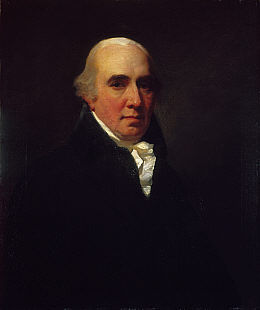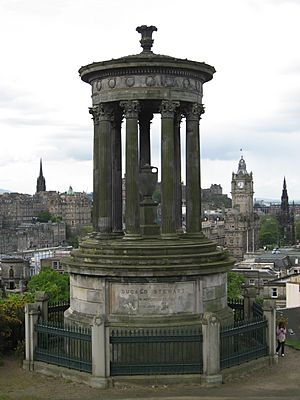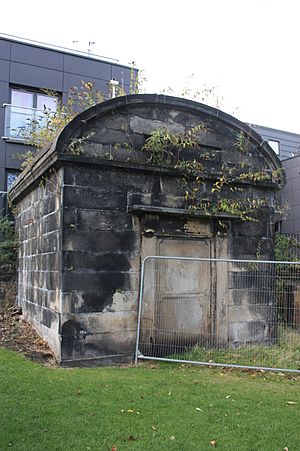Dugald Stewart facts for kids
Quick facts for kids
Dugald Stewart
|
|
|---|---|

Dugald Stewart as painted by Henry Raeburn, c. 1810.
|
|
| Born | 22 November 1753 Edinburgh, Scotland
|
| Died | 11 June 1828 (aged 74) Edinburgh, Scotland
|
| Alma mater | University of Edinburgh |
| Era | 18th-century philosophy |
| Region | Western philosophy |
| School | Scottish Common Sense Realism |
|
Main interests
|
Moral philosophy |
|
Influences
|
|
Dugald Stewart (born November 22, 1753 – died June 11, 1828) was an important Scottish thinker and teacher. He was a philosopher and mathematician. Many people today see him as one of the most important figures of the later Scottish Enlightenment. This was a time when new ideas about science, philosophy, and society were very popular in Scotland.
Stewart was famous for making the ideas of other great thinkers, like Francis Hutcheson and Adam Smith, easy to understand. He taught at the University of Edinburgh, and his lessons were very popular. Many of his students became important people themselves. In 1783, he helped start the Royal Society of Edinburgh, a group for learning and science.
Contents
Early Life and Education
Dugald Stewart was born in Edinburgh, Scotland. His father, Matthew Stewart, was a mathematics professor at the University of Edinburgh. Dugald grew up right there at the university! His mother was Marjory Stewart, who was his father's cousin.
He went to the High School and then the University of Edinburgh. There, he studied mathematics and moral philosophy (which is about what is right and wrong). One of his teachers was Adam Ferguson.
In 1771, when he was 17, Dugald went to the University of Glasgow. He wanted to learn from Thomas Reid, another famous philosopher. Reid's ideas greatly influenced Stewart's own thoughts on morality. While in Glasgow, Stewart became good friends with Archibald Alison, who wrote about art and beauty.
Becoming a Professor
When Dugald was just 19, his father's health started to fail. So, Dugald began teaching his father's mathematics classes at the University of Edinburgh. Three years later, in 1775, he officially became a joint professor of mathematics with his father.
Later, in 1778, his former teacher Adam Ferguson needed someone to cover his moral philosophy classes. Stewart stepped in and taught his own original lessons on morals. In 1785, Stewart took over the main moral philosophy professorship from Ferguson. He held this important position for 25 years.
Stewart made the moral philosophy class a very popular and influential place. Students from England, Europe, and even America came to Edinburgh just to learn from him. He was greatly inspired by Francis Hutcheson, who had taught moral philosophy before him. Stewart's classes covered not only ethics but also ideas about how governments should work.
Influence and Ideas
Dugald Stewart's teachings had a big impact on many people. For example, William Drennan, who helped start the Society of United Irishmen, was one of his students and friends. Stewart's ideas about freedom and government influenced Drennan.
Stewart also influenced writers like Maria Edgeworth and Elizabeth Hamilton. They used his ideas to create educational programs. These programs focused on how important it was for women, especially mothers, to understand how children learn emotions and reasoning.
Stewart was also the first person to teach about political economy at the University of Edinburgh, starting in 1800. He was a big fan of Adam Smith, who wrote The Wealth of Nations. After Smith died, Stewart wrote the first biography about him.
Family Life
In 1783, Dugald Stewart married Helen Bannatyne. Sadly, she passed away in 1787, leaving him with one son, Matthew Stewart.
In 1790, he married Helen D'Arcy Cranstoun. She was a talented person, and Stewart often asked for her thoughts on his writings. They had a son and a daughter. When their son died in 1809, it was a very sad time for Stewart, and he decided to retire from teaching full-time.
Later Years and Legacy

After 1809, Stewart mostly lived at Kinneil House in Bo'ness, which was given to him by the Duke of Hamilton. He officially retired from his professorship in 1820.
In 1822, he had a stroke, but he recovered well enough to continue his studies. Dugald Stewart passed away in Edinburgh on June 11, 1828. He was buried in Canongate Kirkyard, near where he lived.
Memorials
To honor Dugald Stewart, a large monument was built in 1831 on Calton Hill in Edinburgh. It was designed by William Henry Playfair and is a famous landmark in the city.
The University of Edinburgh also has a building named after him, the "Dugald Stewart Building." It was built in 2011 and houses the university's Philosophy Department.
His Writings
Dugald Stewart wrote many important books and essays. Here are some of his main works:
- Elements of the Philosophy of the Human Mind (published in three volumes: 1792, 1814, 1827)
- Outlines of Moral Philosophy (1793) – a textbook that was used for many years.
- Account of the Life and Writings of Adam Smith (1793) – his famous biography of Adam Smith.
- Philosophical Essays (1810)
- The Philosophy of the Active and Moral Powers (1828) – published just before he died.
His complete works were later collected and published in 11 volumes between 1854 and 1858.
His Influence on Others
Dugald Stewart was a very influential teacher. Many of his students became famous in their own right, including:
- Lord Palmerston (who later became Prime Minister of the United Kingdom)
- Sir Walter Scott (a famous writer)
- Francis Jeffrey (a well-known critic)
- Lord Brougham (a politician and reformer)
- James Mill (a philosopher and historian)
- Sir James Mackintosh (a lawyer and politician)
Stewart's popularity came from his clear way of speaking and writing, and his ability to make complex ideas understandable. He played a big role in making "Scottish Common Sense Realism" a leading philosophy in Europe during the early 1800s. This philosophy focused on the idea that humans have a natural ability to understand basic truths.
Stewart believed in the ideas of Thomas Reid and his common sense approach. He also included some ideas from other thinkers who believed in learning through experience. He disagreed with some very complex philosophical arguments, saying he couldn't even understand the ideas of Immanuel Kant, another famous philosopher.
 | Georgia Louise Harris Brown |
 | Julian Abele |
 | Norma Merrick Sklarek |
 | William Sidney Pittman |


